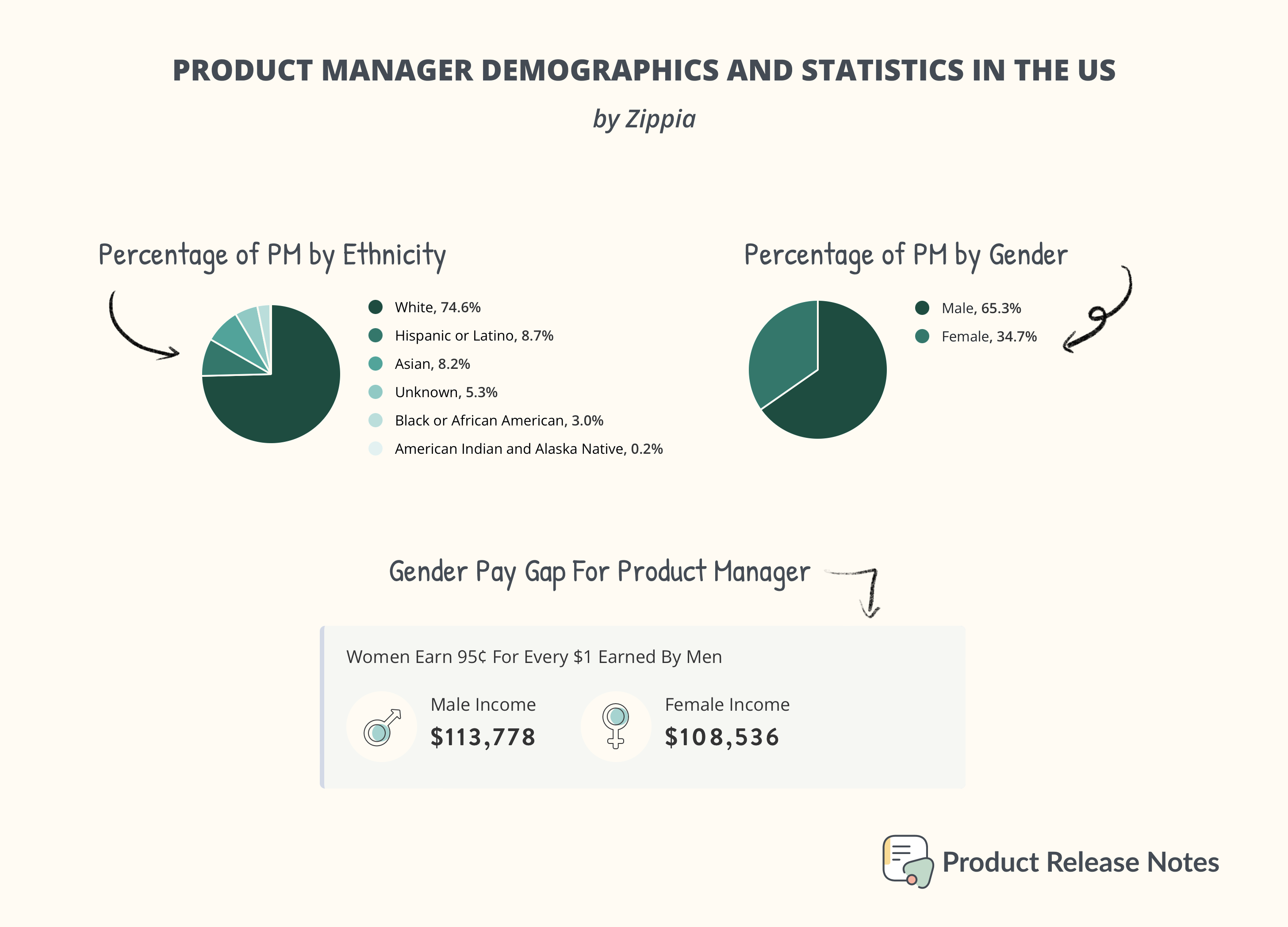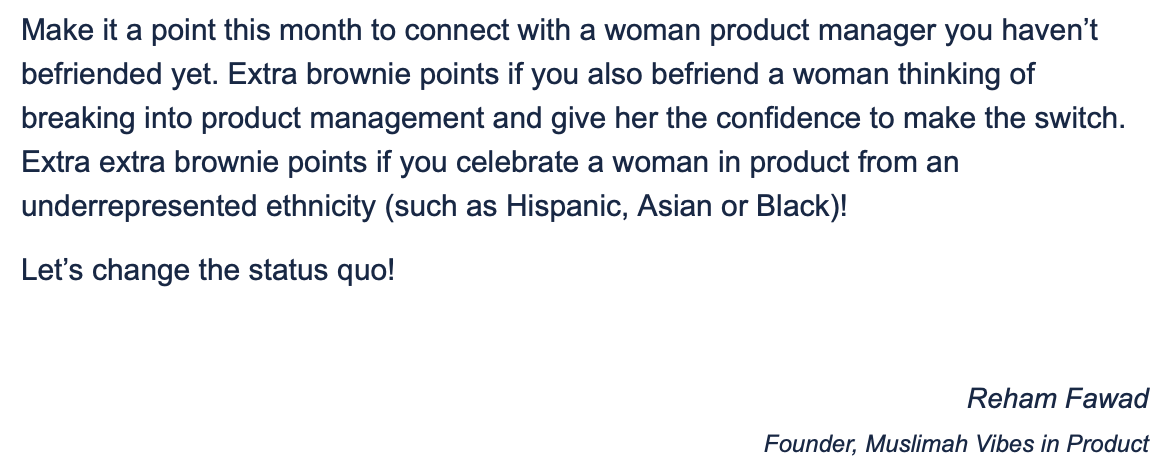Why Product Teams Should Embrace Diversity and Inclusion: Celebrating Women in Product
Diversity contributes to innovation, creativity and productivity in a product team.
Nowadays, the demand for innovation and creativity in the tech industry continues to grow, the need for diversity in product teams has become increasingly important. Women, in particular, bring unique perspectives, skill sets, and experiences to the table that can have a tremendous impact on the success of a product.
According to a McKinsey report: Gender equality within organizations can lead to a 15% increase in profit performance, improved customer experience, and better retention of skilled employees, especially when women hold higher-level positions.
But numbers tell we’re far from this
By doing a quick research you can find many sources of the statistics by gender around the world. For now, I will rely on Zippia’s numbers.
Zippia used a database of 30 million profiles to estimate demographics and statistics for product managers in the US. Their findings were verified against BLS, Census, and current job openings data. The following image shows some of the Product Management statistics by gender and ethnicity.
Less than 35% of product managers are female, and this is largely attributed to the lack of learning opportunities for women with a technical background to transition into product management. Even thou there are a variety of executive education programs, these are rarely targeting women.
But did you know it was not always like this?
Over two decades ago, Product Management was a more balanced job
In 2004, Google required their Product Managers to have a technical background to do revisions in requirement criteria, which led to a trend in the industry for PMs to need technical degrees. This prevented women without technical degrees from switching companies as PMs. They had to look for different roles that didn’t require a technical career.
This change happened to many women back in those days. For example, former Slack Chief Product Officer, April Underwood, shared an anecdote about the challenges of becoming a Product Manager. She started working as an Engineer at Travelocity. When she wanted to be a Product Manager, she ended up as a Partner Technology Manager at Google because she lacked a Computer Science degree, despite she knew how to code.
A balanced Product Team can bring benefits to the company
Diversity of thought: Women can bring different perspectives and ways of thinking to the product and the processes. They may approach problems and challenges in different ways, which can lead to creative solutions and innovations in many industries.
Example
Think about the most common scenario: to build a period app tracker. Women certainly will provide meaningful information from their own experience or close friends and family. Not only that, when you’re targeting for different audiences you can’t assume everyone’s the same.
Think of products about nutrition, dieting, building muscles or losing weight. Biologically speaking, woman’s body may react differently to every change in their routine. Also, the factors and conditions will vary for each person too.
Think about products that focuses on fashion, make up or clothing have to do research on what women likes to wear and feel about it. Maybe they need clothes that adapt better to their body or an outfit that suits for a special occasion.
User empathy: Women make a significant portion of many product user bases, so having female team members can help ensure that the product is designed with their needs in mind. They can provide insights into how the product might be used differently by different user groups.
Example
Imagine an application that is a virtual assistant and serves as a therapist for those hard moments and balance mental health. If the target are men and women, the answers of this AI will have to adapt to the gender because women face different social problems like sexism, harassment, a lack of enough role models in positions of power, economic inequality, insecurity and often more impostor syndrome, the lack of respect for caregiving in some organizations or countries. The list can continue and even if not all women experience all of these problems at the same time, is very probable that we experience at least one of them in our life.
Attention to detail: Many women are known for their attention to detail, which can be a tremendous asset in product development. They can help ensure that every aspect of the product is thoughtfully considered and executed.
Collaboration and communication skills: Women tend to be skilled in communication and collaboration, which are essential skills for any team. They can facilitate productive conversations and help to ensure that everyone is on the same page when it comes to the product's goals and objectives. They can be direct and assertive too.
Imagine women stakeholders or clients that want to share their feedback but there are some aspects that may be better to tell to another woman, to reduce awkwardness or just feel heard by someone that may have gone thru the same things.
Product Managers can contribute with Empathy and Humility
Empathy and humility are two essential traits that every competent Product Manager should possess.
Empathy is the ability to understand and connect with the needs, wants and feelings of your customers. It involves putting yourself in their shoes and seeing the world from their perspective. By practicing empathy, product managers can gain valuable insights into their customers' pain points, aspirations, and motivations, which can inform the development of better products.
On the other hand, humility is the quality of being humble and open to feedback, ideas, and suggestions from others. It involves recognizing that you don't have all the answers and being willing to learn from others' perspectives. As a product manager, humility is crucial because you need to be open to feedback from your customers, team members, and stakeholders. This can help you refine your product vision, prioritize features, and make better decisions.
Great Product Leaders understand that balanced teams with diverse skill sets contribute to innovation and creativity in a company.
Fortunately, more organizations are paying attention to this and are creating different programs for women. Kellogg Executive Education’s Professional Certificate in Product Management: Women’s Cohort, provides support women seek and teaches necessary skills to upgrade and advance their product management careers.
Another program is Woman in Product. This program is dedicated to the advancement of women and non-binary people with a community of 30,000+ will help them thrive in product.
Product People that inspire me and you should follow
Melissa Perri
Melissa Perri is a well-known Product Management consultant and teacher who runs her own company. She believes that great product leaders are essential for successful product management and offers training programs to develop them. She was also appointed by Harvard Business School to teach Product Management in their MBA program.
She wrote a book Escaping the Build Trap: How Effective Product Management Creates Real Value. You can find more about it in one of my previous post:
Julie Zhuo
Julie is the VP of product design at Facebook, and also published a book titled The Making of a Manager: What to Do When Everyone Looks to You. She writes essays on various topics related to career development, and her feed is focused on improving oneself rather than criticizing mistakes.
Kim Scott
Kim Scott is the author of two books and co-founder of Radical Candor, Inc. She has worked as a CEO coach at various tech companies like Dropbox, Qualtrics, Twitter and others. She was a member of the faculty at Apple University. Before her career in tech, she managed a pediatric clinic in Kosovo and started a diamond-cutting factory in Moscow.
Elena Verna
Elena Verna is the Head of Growth at Amplitude, with experience in PLG SaaS companies specializing in acquisition, viral loops, monetization, and retention within product and marketing teams. Her primary mission is to facilitate growth and increase sales by developing a comprehensive marketing plan that will help Amplitude gain a competitive advantage. She has a Bachelor's in Statistics from UC Berkeley.
She also writes on Substack where you can find content about growth systems for B2B and great frameworks.
Btw I love her website! You can find very good memes and poems also.
Leah Tharin
Leah is an experienced tech professional who founded four startups and currently works as Head of Product at Jua.ai works with end-to-end Machine Learning in Weather. She specializes in product-led growth in B2B and offers advisory services to companies with B2B business.
She is a successful go-to expert who offers valuable guidance on product-led growth/sales, organizational scaling, and growth.
Jackie Bavaro
Former Head of Product Management at Asana, where she grew the PM team and oversaw the company's growth from $0 to over $100 million a year. With 15 years of experience, she has worked as a PM for Google and Microsoft and in various PM roles. Jackie has coached, mentored, managed, and advised people in product and co-authored the best-selling book, Cracking the PM Interview.
You can find the link the this book on my previous post.
Gayle Laakmann
She is an author, consultant, and founder who focuses on improving tech hiring for both interviewers and candidates. She has worked as an engineer for Google, Microsoft, and Apple, and discovered a disconnect between candidates, their skill set, and their interview performance. Through her company, CareerCup, she has worked with many top tech companies to reform their hiring practices and implement interviewer training programs. She is the author of three best-selling books and holds multiple degrees in computer science and business.
Amy Mitchell
Amy is passionate about product management and development. Her optimism and strong desire to win makes her excelling at leading global cross-functional teams towards a common goal. She has experience launching and managing products globally in service provider and enterprise markets, with expertise in product line strategy, market analysis, and cross-functional team leadership.
She also writes on Substack from her own experience and covers topics about Product Leadership and tips on how to build world-class products. I can tell you that I’ve been enjoying her content so much recently.
Shyvee Shi
Shyvee is a thought leader in digital transformation and product management with over 10 years of experience in various industries. She has worked with top companies and is currently a Product Manager at LinkedIn and an instructor at LinkedIn Learning. Shyvee is known for her mentorship and coaching abilities and is a sought-after speaker who has taught workshops at leading universities and companies. She also creates daily content on LinkedIn, making her a prolific source of product management and career insights.
Finally, a small challenge for all of us
I’m closing with this small challenge for you. I was inspired by Reham Fawad who shared a very creative challenge in this week’s Mind the Product newsletter issue.








Thanks for the mention with the other women in product Elena! Excellent suggestions for product managers that write about how to be successful in product. Really appreciate your research in product management. Thank you Elena!
Love your list of product folks to follow. I have a few of them already on the list and will definitely check out the rest.